|
.
Comment
> Women In Neighbours: Part Two
by Gareth
Women in soap operas are often given a hard time; they either painted as the eternal victim, struggling to find happiness and to overcome the hardships they face, or as the bitch, who is full of complex emotional problems and struggles to find acceptance. These women have many different hardships heaped upon them before, more often than not, meeting an unhappy end.
However, Neighbours differs in its approach to representing women, and seems to give the audience strong, capable female role models whom every woman can aspire to be like. Here we take a look at how women have been represented in Neighbours throughout the decades, and whether they have been given a good or a bad deal. Part two looks at the transition into, and the beginning of, the 1990s.
|

|
As Neighbours moved into the 1990’s, the programme still had the heavy 1980’s tag around its neck, while its attitudes towards women were still very strong, and rather more modern than its English contemporaries. Still the grandmother figure of Helen Daniels remained, along with her best friend Madge Bishop, and these two women were very good representatives of women of a certain age. Strong, caring and ballsy women, they had both had their own heartaches and happiness and were looked upon as stalwarts of the neighbourhood. Helen and Madge weren’t stereotypes; they had their own personalities and as an audience we genuinely cared for them. When Madge’s beloved husband Harold disappeared while they were on holiday in 1991 and was presumed dead, we all felt her pain and devastation. However, when Harold went, we lost something from Madge; gone was her grit, her determination and everything that made her appealing to the audience, and she seemed to lose her sparkle. In the months following Harold’s death, she struck up a romance with childhood sweetheart Lou Carpenter, but she never really had her heart in it, and it did seem disloyal to Harold to consider getting re-married so soon after his death – especially to a man he despised so much. Was it that the writers were stuck for what to do with Madge after Harold’s departure and they quickly tried to partner her off with someone else? This partnership of Madge and Lou didn’t quite gel with the audience as well as the chalk-and-cheese relationship between Madge and Harold, and in 1992 Madge left to live in Brisbane with daughter Charlene and her husband Scott, and to help them bring up their son Daniel. Madge’s departure saw Ramsay Street lose something – that special character who had grown so iconic and who had been so well-loved.
|
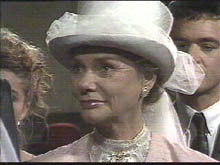
|
We still had Helen Daniels, who gradually became Neighbours itself; but it seemed writers were also having problems coming up with positive storylines for everyone’s favourite grandmother. Always keen to take in a waif and stray, or to help out those in need, it seemed rather far-fetched when Helen took in young artist Nick Page, as it was obviously felt that she needed someone to mother – and this created conflict between Helen and Jim and Beverly, who were sharing No. 26 as a home with her.
As we went into the 1990’s, Helen’s strong characterisation slipped away when she went through one ordeal after another; she suffered a stroke; was blackmailed by Bob Landers, the father of Beverly’s nephew and niece Todd and Katie, who were living with Jim and Beverly; she found happiness with fellow artist Derek Wilcox, but following his death his family contested his will, putting Helen through more heartache than necessary. Following this, she was hospitalised after falling down a flight of stairs, nearly entered a bigamous marriage with Michael Daniels, the cousin of her late husband Bill, and endured more heartache when Todd died and Bob Landers targeted her again, this time taking her hostage at his son’s funeral.
It
seemed heaping misery after misery upon Helen became par for
the course over the years, and it really detracted from the
strong character we had come to know in the first few years
of the programme. Making her constantly a victim went totally
against everything about Helen that we loved and respected,
and putting her through so much heartache became slightly
unbelievable.
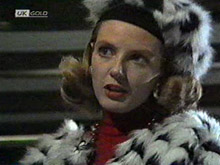 |
More heartache ensued when Jim died and Helen became increasingly lonely at No. 26, succumbing to the treats of alcohol until lodger Annalise put her to her senses. Another romance with Len Mangel, the former husband of old friend Nell, ended in sadness when her step-grandson Michael Martin realised he was just trying to get his hands on her money, and when grand-daughter Julie died tragically after a fall in 1994, Helen found herself in the same position she had twenty years previously; she took in Julie’s widowed husband Philip and their daughters Debbie and Hannah, and became a surrogate mother once again. Elsewhere in Neighbours during the early 90’s, there were strong representations of younger women, who weren’t given heaps of misery to cope with.
Melanie
Pearson had made her first appearance in Neighbours
in 1987 when Henry Ramsay took her home to mother Madge as
his latest girlfriend; her seal-like laugh and wacky behaviour
was more than Madge could cope with, and she was relieved
when an end came to the relationship. However, this wasn’t
the last we saw of Melanie, as she took a job as Paul Robinson’s
secretary and became Des Clarke’s lodger.
The
presence of Melanie in Ramsay Street was a breath of fresh
air; she was unlike anyone we had seen before, or ever would
again, and the nation instantly took her to their hearts.
She may have been wacky, had a tendency to put her foot in
it and had a crazy dress sense, yet she was strong and a good
role model for young women. She was fun, lively and extremely
likeable; the worldwide Neighbours audience took her
to their hearts.
Melanie
was a comedy character who had dramatic storylines, and every
time something went wrong for Mel, we loved her just a little
bit more; we shared her sadness and her triumphs, her pain
and joy. When friend and neighbour Joe Mangel entered into
a bitter custody battle for step-daughter Sky after the tragic
death of wife Kerry Bishop, noble Melanie offered to marry
him if it improved his chances of getting custody, showing
how truly lovely she was as a person. From there on, Melanie
and Joe entered into a will-they-won’t-they relationship,
with viewers eager for them to confess their love for each
other. Every step of the way, every time they got close to
confessing their true feelings for one another, there was
a hurdle, with Melanie even getting engaged to dashing businessman
Simon Hunter. However, in true comic Melanie fashion, when
Joe went on TV show Dream Date to find himself a woman, Melanie
ended up taking the place of a contestant who had dropped
out, and she and Joe were paired up together. Their marriage
was a truly romantic occasion, with them seeming like a match
made in heaven, and their subsequent departures saw Neighbours
lose one of its truly original and memorable female characters
in Melanie. It was with some sadness we learnt in 2003 that
Joe and Melanie’s marriage hadn’t lasted.
|
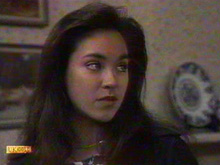
|
Melanie’s
predecessor as Joe’s wife was Kerry Bishop, the hippy-like
daughter of fusspot vegetarian Harold, who came to Ramsay
Street as a single mother, and who quickly struck up a relationship
with Joe Mangel, which was fiercely opposed by her father.
Kerry was a free-spirited young woman who fought for what
she believed in and was a loveable character; in ways she
harked back to the character of Daphne, with her ability to
befriend both the younger and older characters. And, like
Daphne, she met a tragic ending, shot by a duck hunter, fighting
for what she believed in.
Kerry’s
spirit and strength inspired everyone around her, and her
death devastated the whole of Ramsay Street, especially Joe
and his young son Toby who had now lost not one, but two mothers.
|

|
Strong
women continued to be introduced into the programme in the
1990’s, and with the departure of Gail Robinson in 1989, Paul
Robinson was in need of a love interest, and he was given
not one, but two women to dally with; twins Caroline and Christina
Alessi. While Caroline was confident and more than capable
of handling herself in business, Chrissie was slightly shyer
and more withdrawn than her sister. Both girls showed their
power as they duped everyone into believing that they were
one woman – Linda Giles – upon their arrival after entering
a witness protection, yet it was Caroline who was the stronger,
more independent one of the two, while Chrissie found herself
in a troubled relationship with Paul.Caroline relished in
her role at Lassiter’s at Paul’s number two, a role previously
inhabited by his ex-wife Gail, and although she had a troubled
love life from time to time, she always managed to rise above
this. However, Chrissie was more emotional and first had to
fight her sister for Paul’s affections, then the manipulative
Isabella Lopez, who only wanted Paul for a visa to stay in
the country.
After
Paul and Christina finally made it to the altar, they endured
nothing but marriage problems, from her faking her pregnancy
to him suffering a nervous breakdown and severe financial
problems. The final straw came when Paul and Caroline shared
an illicit kiss late one night; Caroline fled to Milan, where
found her dream job managing a hotel, while Chrissie kicked
Paul out of the family home and filed for divorce. It was
only the tragic death of Paul’s step-cousin Todd which made
Christina realise how short life is, and the couple patched
up their differences and left Ramsay Street to live in Hawaii.
|
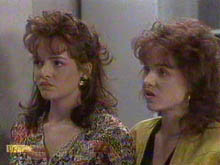
|
Caroline
and Christina were two interesting female characters; one
able to run rings round Paul, another meek and mild and put
down by him. However, they never really had the sparkle or
classic characterisation that predecessor Gail had, which
is a shame, as they could have been remembered more fondly.
Ultimately, I guess they were just too similar; obviously
meant to fill the gap in Paul’s life vacated by Gail, yet
there wasn’t the same passion, the same fire that Paul and
Gail had, and it took the arrival of Gaby Willis at Lassiter’s
to bring back some of the power we so admired in Gail.
The
eldest daughter of Pam and Doug Willis, Gaby had studied business
in Japan and opened her own fashion boutique in Erinsborough
upon her arrival, as well as dallying with both Guy Carpenter
and Glen Donnelly. When her boutique was destroyed in a fire,
Gaby took a job at Lassiter’s as Philip Martin’s number two,
a job position previously filled by Gail Robinson and Caroline.
Fiery, feisty and independent in every way, Gaby really did
hark back to Gail and how she had been able to hold her own
in any situation. In fact, when she fell pregnant, Gaby, the
least maternal woman on the planet, decided she was going
to bring up her son Zac alone, and only later relented and
allowed his father, Jack Flynn, into her life.
Gaby
was one of the strongest female representations Neighbours
had seen, and has seen; she was loveable, passionate and caring
and viewers really took her to their hearts. When she left
Erinsborough in 1994, it would be a long time before we saw
a woman like her again.
Doing
it for the older women in the early nineties were Pam Willis,
Dorothy Burke and Julie Martin, all legendary characters who
created their own fan bases and are still remembered and much-loved
today. Pam was the caring, motherly head of the Willis family
– the first new family introduced into Neighbours since
1985 – and unlike many women before her she was able to juggle
a career as a nurse, take care of her four children and maintain
a successful marriage with husband Doug throughout the years.
While other women of the period had much misery heaped upon
them, Pam managed to rise above much of her troubles, including
Jill Weir’s obsession with Doug, and her own near affairs
with Jim Robinson and widower Tom Weaver.
Dorothy
Burke was another strong female representation, although unlike
Pam she was unmarried, and showed how women of a certain age
could maintain their independence and didn’t need men to fulfil
their lives. As headmistress of Erinsborough High, and a staunch
member of the Ramsay Street community, she built up respect
amongst her neighbours, even more so when she took in youngsters
Phoebe Bright and Toby Mangel. Dorothy was one of the most
memorable women to walk Ramsay Street, and it was only when
Susan Kennedy divorced husband Karl that we saw a woman like
her again.
|
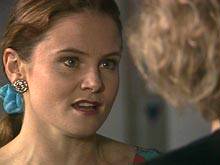
|
Julie
Martin was a throwback to Mrs. Mangel; gossipy, interfering
and thoroughly unlikeable at times, but there was just something
about her that we loved. She often feuded with her neighbours,
always poked her nose into business that didn’t concern her,
yet when she suffered a marriage breakdown and discovered
beloved father Jim wasn’t really her father, and that she
was the product of a rape, the audience really felt for her.
The fact that she was loveable and that we hated her at the
same time made the character more memorable, and the fact
that she was only on the street for three years, yet is still
greatly remembered today as a public institution really shows
the strength of the character, and how well rounded and well
written she was. Her death at a Murder Mystery weekend was
also greatly memorable, and the tragedy of this, as well as
the question as to whether she fell or she jumped made the
whole event all the more exciting.
Although
we had strong female representations throughout the early
nineties, the relationships between the women of Ramsay Street
were weak; where was the rivalry of Madge and Mrs. Mangel?
The close friendship of Madge and Helen? Or of Gail and Daphne?
As we moved further into the nineties, that old adage ‘good
neighbours become good friends’ slipped further and further
out of view… Click here to read part
three of Women In Neighbours.
Back
|

